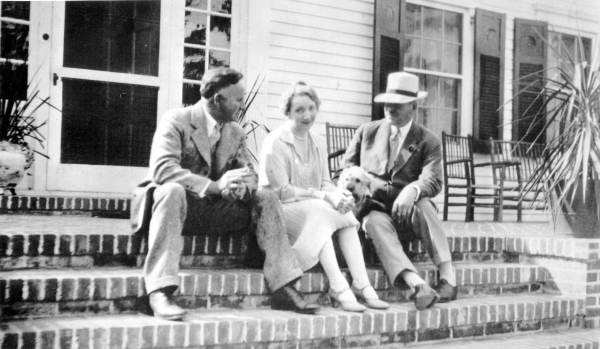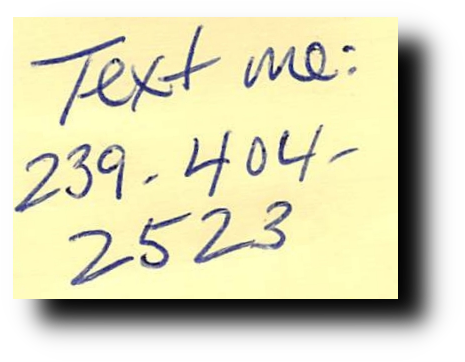Unlawful detainer attorney, Naples, Florida
Local Collier County Attorney
I can help you enforce: "My house, my rules." The unlawful detainer statute is the enforcement of Florida private-property rights. It's your house: you get to say who lives in it.
Have someone in your property who you want removed? Someone who is not a tenant, and not an owner? I can help today! The best way to reach me is by text message.
Send me a text message. Or, send me an email.
Unlawful detainer vs. eviction
Unlawful detainer (chapter 82 of the Florida Statutes) is used to remove family members and guests from your residence, anyone who is not an owner or a tenant. Eviction (chapter 83 of the Florida Statutes) is used to remove tenants. What if he was supposed to pay rent, but hasn't? It all depends on how the person got into the residence. Did the person get in with a promise to pay rent, even if rent was never paid? If so, it's a tenancy. If you just let someone in, even if they pay some bills or utitlites, he or she is likely a guest, and unlawful detainer would apply, not eviction. The papers we file in court are different between unlawful detainer and eviction. Another difference is that with eviction, there's always some notice to the tenant before filing the complaint in court, like a 3-day notice for non payment of rent. With unlawful detainer, the first step is filing the complaint in court. Both proceedings, UD and eviction, by statute, get expedited court hearings.
How long does an unlawful detainer case take to complete?
I usually say about 30 days, but it also depends on the judge's schedule if we have a hearing. A recent UD case I did in Collier County took only 22 days from filing the complaint on Oct. 3, 2024, to the execution of the writ of possession on October 25, 2024.
No-Trespass Order keeping you out of your home?
What if you were arrested for a domestic-violence charge, and as a condition of bond, the judge issued an order that you can't return to your own home? The filing of an unlawful detainer case may help you get back into your home, so long the person you are trying to remove is not an owner.
Squatter's Rights
What are Squatter's Rights? You run into this when there are people living in your property who you didn't allow to live there. You call the sheriff, and the sheriff says it's a civil matter. That's the squatter's right: the sheriff won't remove them as trespassors, but Florida law can help. The unlawful detainer action (not eviction) is the right action to remove squatters from your property. Let me help you with that process.
Have a guest or family member who you want to evict from your house?
The Florida Unlawful Detainer statute can remove guests and family members from your house. Unlawful detainer applies to people who are not on the deed, and are not tenants. Eviction applies to tenants. Unlawful detainer applies to guests and family members who are not owners of the property. Unlawful detainer is similar to eviction: our objective is to get a writ of possession. Unlawful detainer is used, not for tenants, but for guests or family members who are not on the deed.Unlawful detainer steps
Unlike evictions, unlawful detainer cases do not start with a notice to the occupant. From the statute:
The person entitled to possession is not required to notify the prospective defendant before filing the action.
The first step is the court filing. Once the case is filed, we wait until the Clerk issues (signs) the summons we sent in along with the complaint. Once we have the signed summons (which arrives by email), I walk the summons and the complaint to the sheriff for service. The sheriff will go to the property and knock at the door. If no answer, the sheriff will leave and return after six hours. On the second attempt, the sheriff will post the summons and complaint on the door. Posting is all the service we need to remove a person. By posting, the Court gets jurisdiction over the property, also called in rem jurisdiction, as opposed to personal jurisdiction which occurs if the defendant is served personally with the complaint and summons. Once the defendant is served, they have five days to respond to the complaint. If there's a response, then we will have a hearing with the judge. At the hearing, I will ask you five easy questions. The defendant will also have the opportunity to present testimony. From the statute:
The court shall determine only the right of possession and any damages.
This means the Court will hear testimony and evidence as to who has a greater interest in the property. Since the Plaintiff is the owner in the public record, I will argue that the owner has the higher interest in the property.I've had two separate cases where the defendants were represented by lawyers. In those two cases, before starting testimony, I've suggested to the judge that no matter what the defendant testified to, it wouldn't create an interest in land greater than the Plaintiff's interest, as shown in the public record. In both cases, the opposing lawyer agreed with me and did not put on testimony.
If the defendant doesn't respond to the complaint, I will file for a default judgment.
After judgment:
After we get a judgment, by default or after a hearing, we have to wait until the judgment appears in the Clerk's computer. Once it's visible, I will file for a writ of possession. The writ orders the sheriff to remove all people from the property. Once the Clerk issues the writ, I will walk it to the sheriff for service. The sheriff will go to the property, and finding the defendant, will advise the defendant that they need to be out in 24 hours. If the sheriff doesn't find the defendant, the sheriff will post a 24-hour eviction notice. The sheriff will contact you and make an appointment to execute the writ of possession. At the appointment time, the sheriff always arrives early, usually in an unmarked car, and executes the writ, removing the defendant from the property.
Similar to evictions, unlawful detainer cases are advanced on the calendar, meaning they are to be heard quickly, by statute:
All actions under this chapter must be brought by summary procedure as provided in s. 51.011, and the court shall advance the cause on the calendar.

